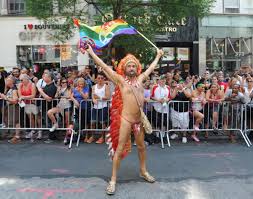On Sunday, I attended the NYC Pride Parade. It was my first time attending any sort of pride parade, and it was a fun and interesting experience. Throughout the past year, I’ve been learning more about the gender and sexuality spectrum and trying to enhance my own understanding of LGBTQ issues. What I’ve learned so far is that I actually don’t know much at all. Usually when talking about systems of oppression and privilege, I fall on the “let me tell you how it is for us folks” side and find myself having to educate others and watch others fumble, trying to grasp the reality of racism, sexism, and classism. Last week was the first time I had to confront my own privilege in regards to my sexuality and how I decide to express my gender. I didn’t know what was expected of me as an ally, what I was allowed to say or not say, and if I even understood all the issues on the table concerning LGBTQ people. It was a very uncomfortable but necessary experience as I usually am the first to call others out for their forms of privilege and am usually very unsympathetic toward their ignorance about the issues that most affect me.
I asked my co-workers, many of whom identify as LGBTQ and gender nonconforming, if they were going to attend the pride parade, and they answered with a definitive “no”: that the parade had been hijacked in recent years by corporate interests, that there was too much emphasis on marriage equality and not enough on other more pertinent issues affecting LGBTQ people, that the pride parade has historically been transphobic, and that there were more local and effective grassroots ways to actually support LGBTQ issues. The critique surprised me. Wasn’t gay pride supposed to be the pinnacle of the LGBTQ movement? Their critique definitely shaded the way I experienced the parade. While I enjoyed it and definitely felt the pride and acknowledged that there needed to be a space to just be proud, I did see what my co-workers meant about corporate and political co-opting (Wal-Mart and the Mayor’s office were in attendance). I also found the parade to be somewhat apolitical. Not that being apolitical is always a bad thing, but coming from outside the LGBTQ movement, the gay pride parade was the only connection I had to understanding the gay rights movement, and I think this is true for the average, woefully uninformed, non-LGBTQ (and many LGBTQ identified) citizens (although I can’t really speak for everyone). For most non-LGBTQ people, just showing up to the parade at all probably felt to them like a great act of solidarity.
After the parade, I had an extensive conversation with some other Moxies about the parade and the gay rights movement as a whole. While we differed in many opinions, I left the conversation feeling like we’d all missed the point. None of us present in the conversation actually identified as LGBTQ nor had we truly ever been confronted with the extreme discrimination, violence, and marginalization that LGBTQ people face , but we still felt validated in our attempts to speak to experiences we’d never had and pass judgement on the actions of LGBTQ people who had or had not decided to march in the parade. Were they apolitical or too political? Did they not understand the most pressing issues of their own movement? Were they actually trying to represent a mainstream, white-washed version of LGBTQ people or were there a diverse enough group of individuals present? Which organizations should get to march in a pride parade? This critique all while sitting on our butts, doing absolutely nothing to further the cause of the LGBTQ movement.
I think as “radical” activists and good-intentioned allies, we fall into the same trap that most people including outspoken bigots do: believing we can actually define the parameters of someone else’s identity and pass judgment on how they choose to express it. As allies, we shouldn’t try to “radicalize” a movement that doesn’t belong to us in the first place. I think the hardest part is really allowing others to speak for themselves by giving them the mic so that their voices and not our own can be heard. I think we need to step back and ask ourselves if we are truly allies, showing up only when asked and to further the cause of the movement without rushing to define it for our own purposes, then deciding if it is worthy enough or “radical” enough for us.
Easier said than done, as I have learned this week.



Mina – what an insightful post! We can’t ever truly know someone else’s experience. We can only continually remind ourselves of that fact and thereby remain curious about other’s experiences. Case in point – your co-workers comments on the parade were eye-opening to me. I had never considered that perspective before!
Melanie